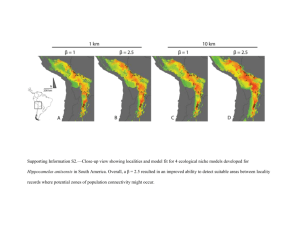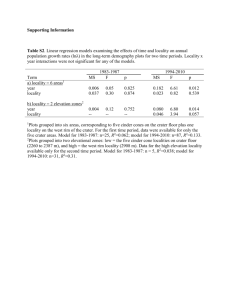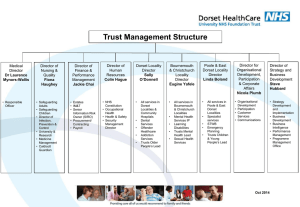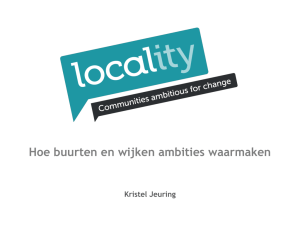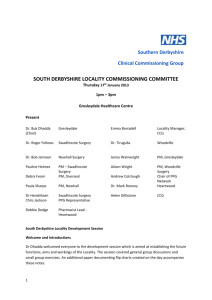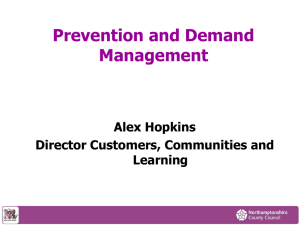Making or Shaking the State
advertisement
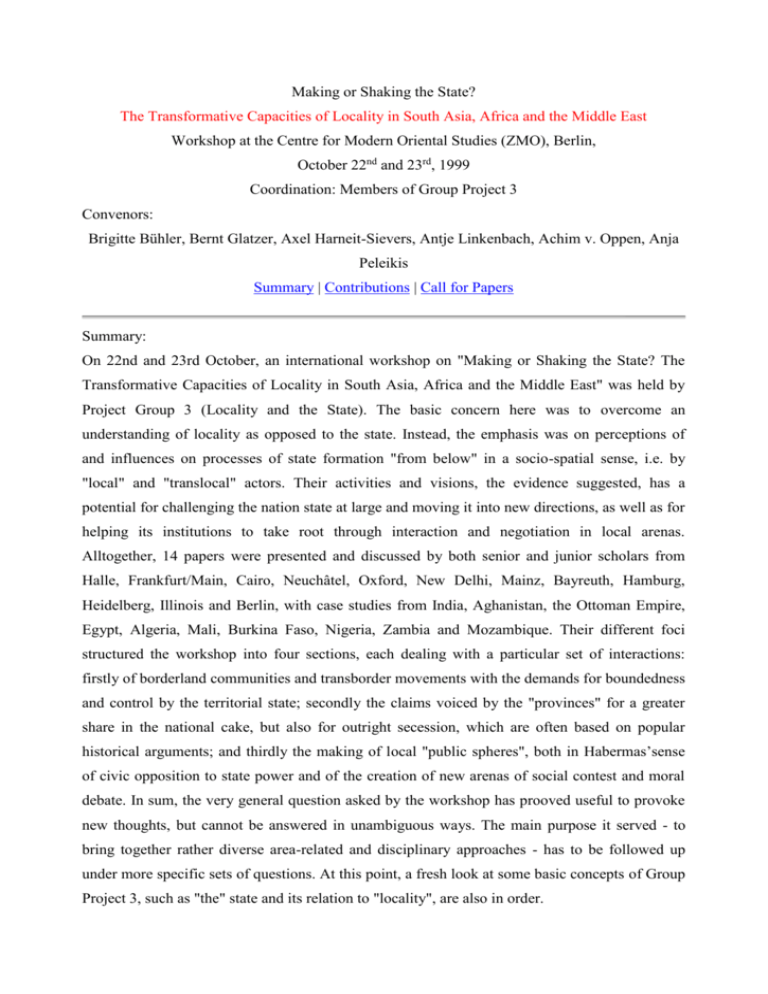
Making or Shaking the State? The Transformative Capacities of Locality in South Asia, Africa and the Middle East Workshop at the Centre for Modern Oriental Studies (ZMO), Berlin, October 22nd and 23rd, 1999 Coordination: Members of Group Project 3 Convenors: Brigitte Bühler, Bernt Glatzer, Axel Harneit-Sievers, Antje Linkenbach, Achim v. Oppen, Anja Peleikis Summary | Contributions | Call for Papers Summary: On 22nd and 23rd October, an international workshop on "Making or Shaking the State? The Transformative Capacities of Locality in South Asia, Africa and the Middle East" was held by Project Group 3 (Locality and the State). The basic concern here was to overcome an understanding of locality as opposed to the state. Instead, the emphasis was on perceptions of and influences on processes of state formation "from below" in a socio-spatial sense, i.e. by "local" and "translocal" actors. Their activities and visions, the evidence suggested, has a potential for challenging the nation state at large and moving it into new directions, as well as for helping its institutions to take root through interaction and negotiation in local arenas. Alltogether, 14 papers were presented and discussed by both senior and junior scholars from Halle, Frankfurt/Main, Cairo, Neuchâtel, Oxford, New Delhi, Mainz, Bayreuth, Hamburg, Heidelberg, Illinois and Berlin, with case studies from India, Aghanistan, the Ottoman Empire, Egypt, Algeria, Mali, Burkina Faso, Nigeria, Zambia and Mozambique. Their different foci structured the workshop into four sections, each dealing with a particular set of interactions: firstly of borderland communities and transborder movements with the demands for boundedness and control by the territorial state; secondly the claims voiced by the "provinces" for a greater share in the national cake, but also for outright secession, which are often based on popular historical arguments; and thirdly the making of local "public spheres", both in Habermas’sense of civic opposition to state power and of the creation of new arenas of social contest and moral debate. In sum, the very general question asked by the workshop has prooved useful to provoke new thoughts, but cannot be answered in unambiguous ways. The main purpose it served - to bring together rather diverse area-related and disciplinary approaches - has to be followed up under more specific sets of questions. At this point, a fresh look at some basic concepts of Group Project 3, such as "the" state and its relation to "locality", are also in order. Workshop Contributions Session 1: (Trans-) local spaces and national territory Günter Schlee (Halle): Nomads, old and new, and the concept of bounded territory (abstract) Carola Lentz (Frankfurt/Main): "This is Ghanaian territory":Land conflicts in transnational localities on the Burkina Faso – Ghana border (abstract) Khaled Adham (Cairo):Using urban boundaries to redefine the role of institutions: The case of the cultural park for children in Cairo (abstract) Pierre Centlivres (Neuchâtel): State, national awareness and levels of identity in Afghanistan: From monarchy to Islamic state (abstract) Bernt Glatzer (ZMO): Broken structures: Afghan concepts of locality, tribe and state (abstract) Session 2: Local histories in national politics Axel Harneit-Sievers (ZMO): Federalism to the bitter end: The politics of history in Eastern Nigerian "autonomous communities" vis-a-vis the state (abstract) Achim von Oppen (ZMO): The Cinderella complex: Local historians and the Central African state (abstract) Session 3: Voices from the provinces Tilman Hannemann (Bremen): Makhzan-tribe relations and the Gahiliya-question in 18th Century Kabylia (abstract) Jens Hanssen (Oxford): Imperial and local dimensions of urban politics in late Ottoman Beirut (abstract) Javeed Alam (New Delhi): Symbiotic contests: The region and the nation state Session 4: The local making of public spheres Elisio Macamo (Bayreuth): Building the state on shaky foundations: Pentecostalism as public space in Mozambique (abstract) Pierre-Yves Le Meur (Mainz): Coping with institutional uncertainty: The unmaking of the local state in Benin (abstract) Antje Linkenbach (ZMO): Shaking the state from the margins: Social movements and the emergence of a public sphere in the Indian Himalayas (abstract) Dorothea Schulz (Berlin): "In pursuit of publicity": Talk radio and the imagination of a moral public in urban Mali (abstract) Call for Papers: "The simplicity of the organisation for production in these self-sufficient communities that constantly reproduce themselves in the same form ... [is] in such striking contrast to the constant dissolution and refounding of Asiatic States, and the never-ending changes of dynasty. The structure of the economic elements of society remains untouched by the storm clouds of the political sky." (Karl Marx, Das Kapital I, IV.12, our translation) Marx’s famous description of ancient India depicts the non-European state as dynamic, but distant from the unchanging localities over which it ruled. Today, of course, few would regard localities in Asia and Africa as unaffected by historical change. However, the conceptualization of the Asian and African state as external to localities remains pervasive in social theory. We would like to challenge this view by raising two questions: Is it not more adequate to assume that locality (and translocality) in Asia and Africa is often "produced" by interaction with the state institutions they appear to be so distant from ? And should we go even further and regard the state itself as being (re-)constituted to some extent through its interactions with locality ? In a number of case studies in our Group Project on "Locality and the State" at the Centre for Modern Oriental Studies, we have been examining constructions of spatial and social order in modern Africa and Asia in a historical perspective. So far, we have focussed mainly on the various ways in which particular places and areas are, and have been, produced by local and nonlocal actors in changing contexts such as the territorial/nation state still emerging on a worldwide scale, as well as other factors of globalization. We have come to understand locality as a field of social contest and negotiation where different actors, concepts and discourses play their part. We also see locality as not necessarily restricted to a particular place or territory (village, region) but as including a variety of crosscutting ties with other places, thus constituting translocal social spaces and communities. However, we began our research on the assumption that localities and supralocal entities, especially the state in its various institutional manifestations (federal state, colonial state, nation state), constitute each other mutually. From this perspective, the discourses, policies and struggles of social actors in a particular location are not only seen as contributing to the making of their "locality", but as also influencing the conceptualization and functioning of the state and its policies. Therefore, we stress analytically that "the" state should not be seen as divorced from or even opposed to locality but as a set of social institutions to which local social actors actively relate, and which is effectively (trans-)formed in the process. Instead of just taking a downward look at the production of locality, we want to adopt an upward perspective in our workshop,. To put it bluntly, we want to ask: In what way does locality produce the state ? Or, to be more specific: In what way do local agency and local discourse contribute to the constitution and re-constitution of the state? In this workshop we would like to explore various modes by which processes of state formation are perceived and influenced from below. These could include local debates and activities which actually challenge and help to transform government policies (e.g. locally-based social movements) or under certain circumstances even shake the state, but also the more subtle forms of local appropriation of the state that tend to stabilize its structures and provide it with additional legitimacy. We envisage an exchange on empirical case studies dealing with the regions we work on. They should start from particular local (or translocal) experiences but share our concern for the more general questions outlined above. They should address some of the following issues in particular: How is the central (federal, national) state experienced and perceived in a particular locality ? What are the practices, discourses, media and organizations of local agency and identity vis-à-vis state institutions and policies ? In what way and at what stage can these expressions of locality be seen as stabilizing or challenging the state ? What are the particular positions and potentials of translocal communities or networks vis-à-vis the state ? To what extent do localities introduce alternative ideas of legitimacy and accountability or even "modernity"? Do these ideas feed into concepts of "civil society", i.e. public control and negotiation of the state ? Or do they foster visions of "decentralization", of breaking down the state into a network of localities ? The workshop will bring together the members of the group project and a number of other researchers who share the research perspective outlined above. In order to provide a forum for intense discussion, the workshop is restricted to active participants who will either present a paper themselves, give a comment or act as a discussant. Other research fellows of the Centre for Modern Oriental Studies are also welcome. The workshop will take place on the premises of the Centre at Kirchweg 33, Berlin–Nikolassee. Convenors: Brigitte Bühler, Bernt Glatzer, Axel Harneit-Sievers, Antje Linkenbach, Achim v. Oppen, Anja Peleikis [back to Homepage]
